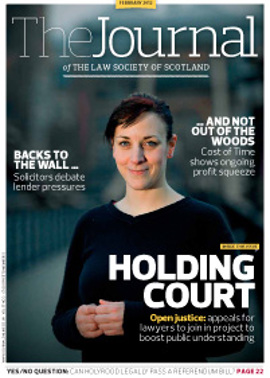Beating the stress bug
Stress is now the most common cause of absence from work, and almost three-quarters of lawyers calling LawCare complain of intolerable stress levels. A great deal of the stress we feel is as a result of external factors such as a high workload, and there is little we can do to change this. But stress is merely our reaction to the pressures on us, and we can change ourselves. Good time management can make all the difference to your working life and stress levels.
Many lawyers have the compulsive and perfectionist personality that makes them more prone to stress. The typical type A personality is competitive and driven, loves a challenge and enjoys the feelings of confidence and elation that comes with achieving. The type B personality is mellow and relaxed, approaches tasks methodically and likes to laugh and take time for him/herself. Type B people may not make successful, high-flying lawyers (nor want to), but they are generally more able to cope with pressure and maintain perspective.
Stress can be caused by your own thoughts and beliefs, for example:
- I must always be completely competent.
- I must be in control of events and people.
- I must accept every work matter I am offered.
- I must be better than everyone else.
These beliefs, and other unhelpful negative thoughts, should be challenged because they create anxiety and are self-evidently not true.
Managing your time can help alleviate pressure, and the first way to do this is to identify priorities. Vilfredo Pareto said, “When you separate the vital few from the trivial many, you can concentrate your time where the rewards are greatest.” The Pareto Principle states that 80% of your results come from 20% of your effort.
Recognising your 20% can help. For example, are you more productive in the mornings? Do you procrastinate and waste hours replying to emails which don’t really need a reply, or at least not right away?
Using the four quadrants (below) to categorise tasks can help with prioritising. Most of your time should be spent in squares 1 and 2.
|
One Urgent and important |
Two Not urgent but important |
|
Three Urgent but not important |
Four Not urgent or important |
Make a “to-do” list with written and specific goals, and tasks listed in order of importance. You might like to use the following system:
Absolutely must get done today. Top priority.
Best if done today, but not as urgent as A.
Could wait until tomorrow.
Delegate—this could be done by someone else.
Eliminate—this doesn’t need doing at all.
When planning your day, always build in time to think and reflect, time for crisis planning, and lunch and coffee breaks. If possible, lunch somewhere other than your desk to give yourself a stress-busting break in the middle of the day. If you are someone who typically experiences the “post-lunch dip” – a period of lethargy after eating – then eat a lighter lunch at the beginning of your lunch hour, and perhaps take an energising walk, or even a power-nap (provided you set an alarm!).
For more help with planning your day and prioritising tasks, ask for a copy of LawCare’s Anti-Stress Desk Workbook or download the worksheet from our website, www.lawcare.org.uk/freedownloads.htm.
As far as possible, avoid time wasters – colleagues dropping in to chat; waiting for printers to become available etc. One of the biggest time wasters is meetings, so ensure meetings you attend are necessary, remain in control of the meeting, and have a set finishing time. If you are not in a position to dictate regarding meetings, then make it clear to whoever is running that meeting that you have limited time available. Saying “No”, especially to superiors trying to give you additional work to do, is also a vital skill to learn, and asserting yourself in any way is good practice. For a list of creative ways to say No, ask for LawCare’s information pack on stress and depression or download it from our website, as above.
LawCare offers free and confidential support to all members of the legal profession, their families and staff. The helpline is available on 0800 279 6869
9am to 7.30pm on weekdays and
10am to 4pm at weekends.
There is also a comprehensive website at www.lawcare.org.uk.
In this issue
- Credit hire: a tug of war?
- As others see them
- Taking care of the dead
- Act like a trustee, think like a fund manager
- Beating the stress bug
- Reading for pleasure
- John McNeil, CBE, WS: an appreciation
- Opinion column: Open Justice
- Council profile
- Book reviews
- President's column
- On the move
- Between a rock and a hard place
- Tough times are still ahead
- Care: a new direction
- Officer class
- Open questions
- Fuller benches
- The limits of hearsay
- If you don't ask, you don't get?
- Fees: not so simple?
- Easing the debt block
- Registering our concerns
- Room at the top
- The best of times, the worst of times
- Law reform roundup
- Work and Cancer: employers’ toolkit
- From the Brussels office
- Post with caution
- Ask Ash
- The learning curve
- Business checklist
- Hear us, we say






